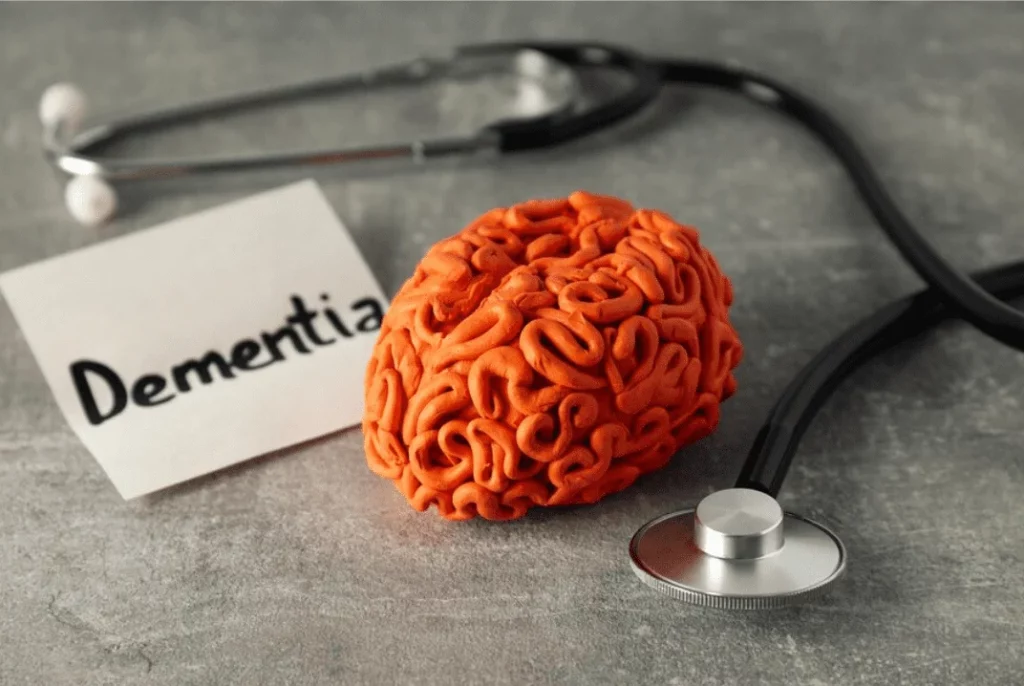Did you know that over 55 million people suffer from at least one form of dementia? This was according to the World Health Organization’s study conducted in March 2023. But the great news is that many more research studies have recommended that vitamins help with the condition in one way or another.
Note that vitamins cannot treat or reverse the condition. However, they play a huge part in making life more comfortable and happier for dementia patients.
In this article, we’ll explore all the aspects of vitamins for dementia patients, starting with what dementia is, the types (and forms), and what vitamins dementia patients should take.
Ready for this? Let’s get started!
What is the meaning of dementia?

According to the Oxford Languages Dictionary, it is a condition that causes a person to progressively lose memory and the ability to think abstractly. One primary way to identify a person with dementia is when the patient constantly forgets things or recent events. Another way to know if a person has dementia is if the person always seems to misplace things, get lost, or become confused even while doing (or being surrounded) by familiar things.
But these aren’t the only ways to tell;
Signs and symptoms of dementia
The condition affects everyone differently, and some people might have a prevalence of one symptom more than another. Nonetheless, here are the general things a dementia patient goes through:
- They forget things easily (and all the time).
- They misplace things or get confused too often.
- They tend to lose track of time.
- They start to become indecisive, even if they weren’t before. This could also be portrayed as taking a longer time to decide or easily getting distracted when deciding.
- Inability to follow conversations.
Besides these physical signs, dementia patients also go through some emotional or mental stress. Some of them are;
- Getting angry, sad, or anxious about the frequent and progressive memory loss.
- They go through an obvious change in personalities.
- Some start to withdraw from their social life, work, or their family.
- They start to become less interested in matters dealing with emotions.
Should Dementia Patients Take Vitamins?

The short answer is yes, especially since vitamin deficiency is one of the causes of dementia in the first place. But remember, vitamins cannot cure dementia, and neither can they (in that sense) prevent it. So, what can vitamins do?
Why Taking Supplements for Dementia is Important
Besides the fact that vitamins and other natural supplements may be the next resort for most people, it’s also for a good reason. The benefits of vitamins for dementia patients differ with respect to the condition’s form and the vitamin type.
For instance, vitamin E could slow down the progression of the illness and improve cognitive functioning, while folates reduce the risk of cognitive decline. Nonetheless, all the vitamins work together to promote stronger brain cells.
Still, patients must seek the advice of healthcare professionals for guidance on when and how to use the vitamins. It’s also needed to ensure that there won’t be any potential interactions with other possible health conditions or treatments.
6 Best Vitamins For Dementia Patients (with Benefits and Food Sources).

The following are some of the essential vitamins that you can take or recommend to dementia patients. Remember to consult a health care professional or specialized care personnel for prescriptions and guidance on how to use them. That said, here are the supplements that can help:
Vitamin A
In case you don’t know, this vitamin works directly with the repair and growth of neurons (the cells that transmit information in the brain). Taking more vitamin A would boost the neurons of people with dementia and delay the effect of memory loss or forgetfulness. Vitamin A nutrients can be found in bright orange and yellow fruits and vegetables, such as sweet potatoes, carrots, pumpkin, and cantaloupe.
Vitamin B complex
This complex form of vitamin contains numerous elements that aid the betterment of dementia patients. For one, vitamin B reduces the level of homocysteine in the body (which is an acid that works toward brain cell destruction. By taking vitamin B, you’ll be reducing the risk of Alzheimer’s. You can find vitamin B in brown rice, quinoa, meat such as chicken and beef, fish like salmon and tuna, or dark leafy greens like spinach and kale.
Which vitamin B is best for dementia?
The table below shows the list of vitamin B complex forms that are particularly beneficial for people with dementia.
| Vitamin B forms | Function |
| B1 (Thiamine) | Thiamine is important for brain function and helps to support the nervous system. A thiamine deficiency can cause a condition called Wernicke-Korsakoff syndrome, which can lead to memory loss and confusion. With this in mind, some studies have suggested that vitamin B1 supplements may help improve cognitive function in individuals with Alzheimer’s or other forms of dementia. |
| B6 | Vitamin B6 helps to regulate levels of homocysteine, an amino acid that can cause damage to brain cells. High levels of homocysteine have been linked to increased risk of cognitive decline and dementia. Therefore, getting enough vitamin B6 through food or supplements may help to lower homocysteine levels and reduce the risk of dementia. |
| B12 | Vitamin B12 plays a crucial role in brain function and the production of red blood cells. Deficiency of Vitamin B12 can cause neurological symptoms such as memory loss, depressive symptoms, and confusion. Studies have shown that adequate intake of vitamin B12 may prevent cognitive decline and brain shrinkage in older adults, which may help to reduce the risk of developing dementia. |
Vitamin C
Besides B, vitamin C (the notable water-solution vitamin) also has its part to play in making the life of a dementia patient slightly better. Besides the fact that vitamin C also contains antioxidants, it also supports the immune system, which, in turn, works to delay the onset of the condition. The great news is that vitamin C is one of the easiest vitamins to find. Look in citrus fruits (oranges, grapefruit, or berries) and in dark leafy greens for some vitamin C.
Vitamin D
The vitamin that promotes strong bones is also great for people with dementia, not to mention that it’s easier to get vitamin D just by sitting out in the morning sunlight. That said, vitamin D does not just work for bones; it has also been discovered to improve cognitive function in older adults. It has anti-inflammatory properties that can reduce damage to brain cells and hence work against Alzheimer’s. For some shot of vitamin D, fix yourself a meal with fortified cereals, fatty fish like salmon, and egg yolks.
Vitamin E
Easily found in nuts and seeds, vitamin E is known to be a powerful antioxidant. Antioxidants are essential components of food nutrients that have only one job to do — to protect your cells from damage caused by free radicals. Vitamin E is saturated with antioxidants and hence aids in improving the cognitive function of dementia patients. Studies have also shown that vitamin E helps to slow down the onset of Alzheimer’s Disease in older people.
Vitamin K
While this vitamin reigns majorly in the aspect of blood clotting, it also has little role in the improvement, repair, and management of brain function. On top of this, studies have shown that vitamin K may help delay cognitive decline. That is, you may be able to length your time when you talk more about Vitamin K. So, where can you find the vitamin? You can find vitamin K in leafy greens such as kale, spinach, and collard greens.
What tablets are good for dementia?

Besides vitamins, dementia patients are also advised to talk about some beneficial nutritional supplements for cognitive benefits:
Zinc
Zinc, found in foods such as oysters, lean meats (like chicken and beef), nuts (like almonds and cashews), and legumes (such as lentils and chickpeas), helps to improve cognitive function. Besides this, the supplement also helps to reduce inflammation. While you may be able to purchase some from a local drugstore, it’s best to consult a medical professional before you begin the dosage.
Magnesium
Similar to Zinc, in that it is a mineral, Magnesium is essential for numerous bodily functions such as bone health, muscle function, energy production, blood sugar regulation, blood pressure regulation, and anti-inflammatory effects.
But beyond this, Magnesium also helps regulate neurotransmitter function, may improve memory, and reduce the risk of developing neurological disorders such as Alzheimer’s and even Parkinson’s disease.
Natural sources can be found in dark leafy greens such as spinach and Swiss chard, nuts like almonds and cashews, and whole grains like brown rice and quinoa. The supplements are sold in local drug stores, but it’s best to get a medical prescription.
Omega-3 Fatty Acids
These healthy fats have been shown to improve cognitive function and reduce inflammation in the brain in multiple ways. Besides lowering the risk of heart disease, Omega-3 fatty acids can also improve memory, attention, and overall cognitive function, including reducing the risk of developing dementia.
Some studies suggest that omega-3 supplementation may slow cognitive decline in individuals with mild cognitive impairment and Alzheimer’s disease. Despite being able to find these supplements in tablet orma, you can find Omega-3 fatty acids in fatty fish such as salmon and tuna, as well as in plant foods like flaxseeds and chia seeds.
Getting Help

Never try to treat dementia by yourself. Apart from the fact that it worsens over time, it’s best to receive proper treatment and avoid being alone. That said, you should consider the services of Emerest, which are specialized home care services for dementia patients.
Beyond basic services, we ensure your health, comfort, and peace of mind. From meticulous kitchen care to expert laundry services, we cover all essential tasks for a hygienic home. Our caregivers also assist with food and household supplies, relieving your burden. Enjoy a clutter-free space and focus on what matters to you while benefiting from a cleaner and harmonious living environment.
While there are multiple services to choose from, you can also choose a custom service to personalize your care and ensure that you receive the best treatment overall.
Conclusion
Dementia affects too many people not to do anything about it. Indeed, there may not be a cure, but by taking the best vitamins (A, B, C, D, E & K), people with dementia can either delay the onset of the illness or better cope with its symptoms. Other supplements with cognitive benefits include zinc, Magnesium, and omega-3 fatty acids.
Overall, it’s advisable that dementia patients curate a healthy diet, seek professional help, and sign in to a home care center for better assistance.